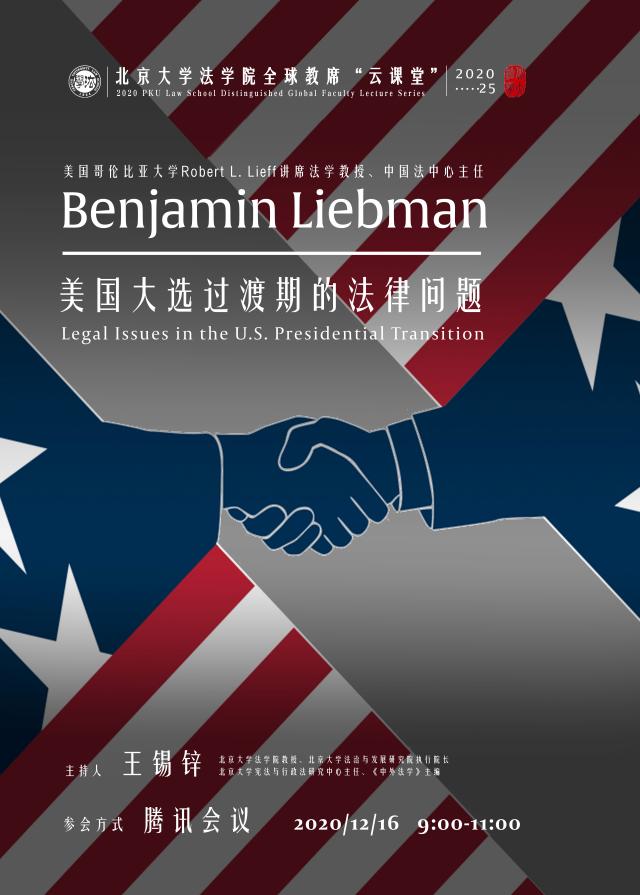全球教席“云课堂”——Benjamin Liebman:美国大选过渡期的法律问题
时间:2020-12-11 来源:作者:
全球教席“云课堂”25讲
题目:美国大选过渡期的法律问题——一场Benjamin Liebman教授与王锡锌教授的对话 (Legal Issues in the U.S. Presidential Transition: A Dialogue with Professors Ben Liebman and Wang Xixin)
时间:2020年12月16日(周三)9:00-11:00
腾讯会议ID:809 246 932
开讲学者
Benjamin Liebman(美国哥伦比亚大学 Robert L. Lieff 讲席法学教授、中国法中心主任)
主持人
王锡锌(求一个安全的网赌网站(中国)有限公司教授、公司法治与发展研究院执行经理、公司宪法与行政法研究中心主任、《中外法学》主编)
开讲学者简介

Benjamin Liebman 教授的研究主要集中在中国法院、中国侵权法、中国刑事诉讼法、舆论对中国法制的影响上。他的著作包括《威权的正义:存在中国模式吗?》(剑桥大学出版社,2017)和《看得见的手:中国国家资本主义的制度意涵》(牛津大学出版社,2016)。他曾任 Sullivan & Cromwell 律师事务所伦敦和北京办事处合伙人、David Souter 大法官和美国第一巡回法院 Sandra Lynch 大法官的法官助理。
Benjamin Liebman is the Robert L. Lieff Professor of Law and director of the Center for Chinese Legal Studies at Columbia Law School. He is also the Director of the Parker School of Foreign and Comparative Law. His research focuses on Chinese courts, Chinese tort law, Chinese criminal procedure, and the impact of popular opinion and populism on the Chinese legal system. His publications include Authoritarian Justice in China: Is there a Chinese Model? (with Chen Weisteng, Cambridge University Press, 2017 ) and Regulating the Visible Hand: The Institutional Implications of Chinese State Capitalism (with Curtis J. Milhaupt, Oxford University Press, 2016). Prior to joining Columbia Law School in 2002, Liebman was an associate in the London and Beijing offices of Sullivan & Cromwell. He also previously served as a law clerk to Justice David Souter and to Judge Sandra Lynch of the First Circuit.
讲座摘要
距离美国总统拜登就职还有一个多月的时间,人们的关注焦点已经从选举转向了另一组法律问题,即拜登政府能以多快的速度逆转特朗普政府的关键政策。在此次“云课堂”中,Benjamin Liebman教授与王锡锌教授将以对话的形式讨论行政权力、行政法,以及拜登政府在试图修改或逆转特朗普政府在气候变化、移民和经济这三方面的政策时所需要的步骤和将面临的挑战。
With just over a month until President Biden takes office, focus is turning from the election to another set of legal questions: just how quickly can the Biden administration reverse key Trump administration policies. Join Professors Liebman and Wang as they discuss executive power, administrative law, and the steps and challenges the Biden administration will confront as they seek to modify or reverse policies on climate change, immigration, and the economy.






